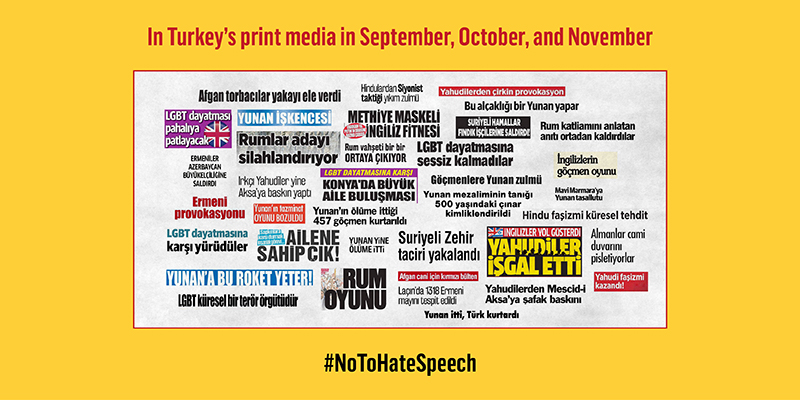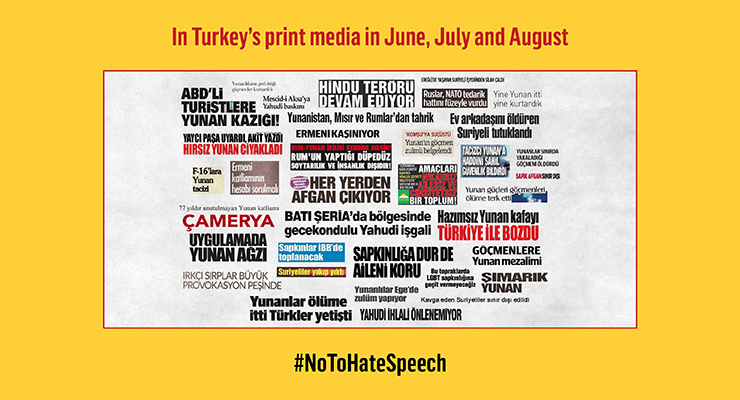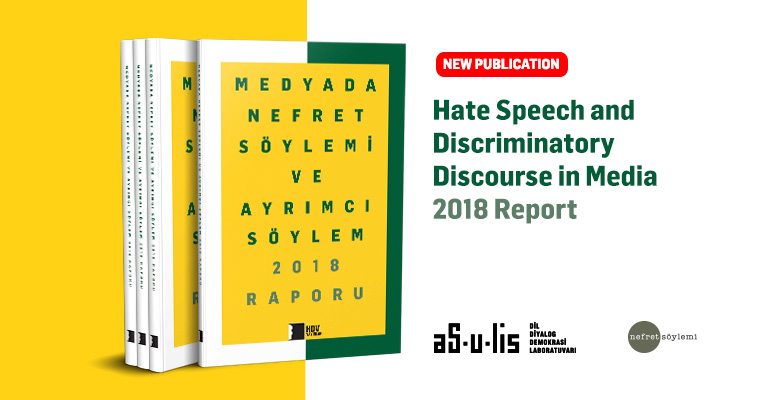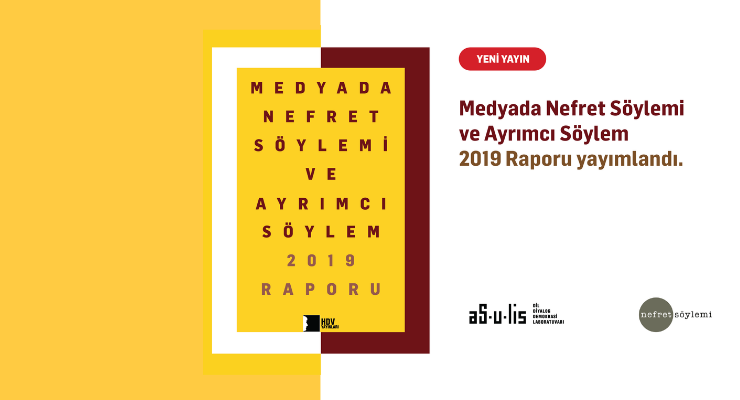Using the method of critical discourse analysis, we evaluated news articles and columns that were printed in September, October, and November 2022 and targeted national, ethnic, and religious identities, LGBTI+ people, and women. You may access news clippings and detailed analysis at “Hate Speech in the Press: Our Selections from September, October and November.”
In the Turkish print media in September, October, and November;
- The Greek identity was referred to with negative expressions such as aggression, violence and a lack of humanitarian values in coverage of the tensions between Turkey and Greece and the Greek state’s policies toward migrants.
- The Armenian identity was targeted in news about tensions between Azerbaijan and Armenia. Armenians were designated as violent and as a menace.
- Homophobic discourse targeting groups for their gender identity and sexual orientation was produced by portraying LGBTI+ people as a threat to youth, family and society.
- The Syrian and Afghan identities became the target of hate speech, associating it with crime to create the perception it poses a threat to the social order.
- Responsibility for actions committed by a Jewish group was generalized to the Jewish identity and existing prejudices against Jews were reinforced.
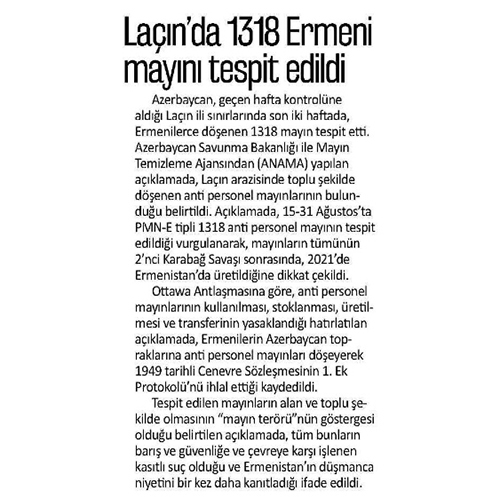 1 September 2022 |
1. Yeni Akit, “1318 Armenian mines detected in Laçın” The news about the Azerbaijan Defense Ministry’s statement on the mines they detected in the town of Lachin, located between the borders of Armenia and Azerbaijan targets the Armenian identity in its headline. While the statement is being reported, the identity is associated with violence and depicted as a threat with the phrase “Armenian mine” in its headline. The existing prejudices and hostility against Armenians are reinforced. |
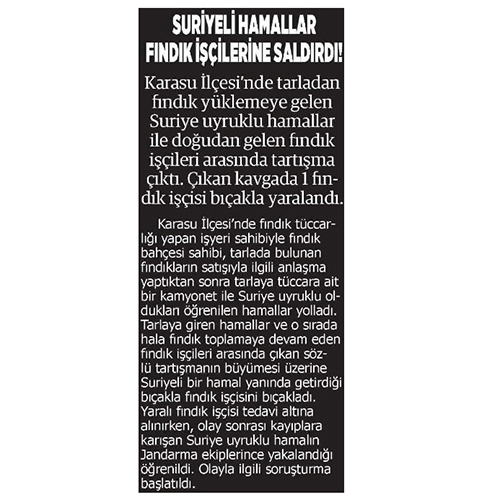 5 September 2022 |
2. Adapazarı Akşam, “Syrian porters attacked hazelnut workers” An attack alleged to have occurred between two people working in a field in Sakarya province’s Karasu district is covered by associating an identity with the incident. Although the crime has nothing to do with identity, the Syrian identity is emphasized in the headline and the story. By connecting an identity with crime, hate speech is produced, and prejudices and hostility towards Syrians are reinforced. Designating refugees and migrants as threats and dangers fuels existing discrimination against these groups. |
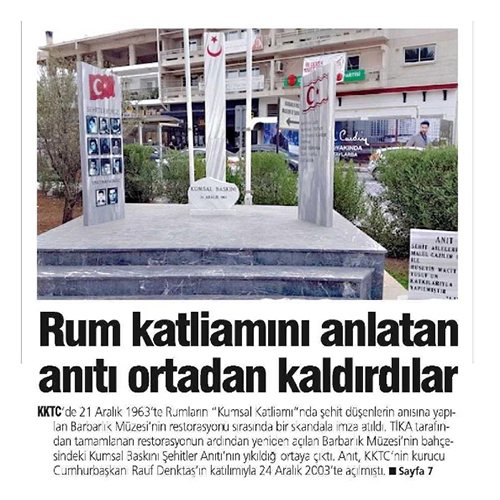 7 September 2022 |
3. Türkiye'de Yeniçağ, “They destroyed the monument describing the Greek massacre” The story is about the restoration process at a museum in northern Cyprus and the demolition of a monument in the museum garden. The monument in question is said to “describe the Greek massacre” in the headline. Actions blamed on a group of Greek Cypriots in 1963 are generalized to the whole identity with expressions such as “Greek massacre” and “Greek brutality” in the text and headline. Greek Cypriots are associated with violence and aggression, generating hate speech. Negative prejudices against Greek Cypriots increase, and the perception of hostility is reinforced. |
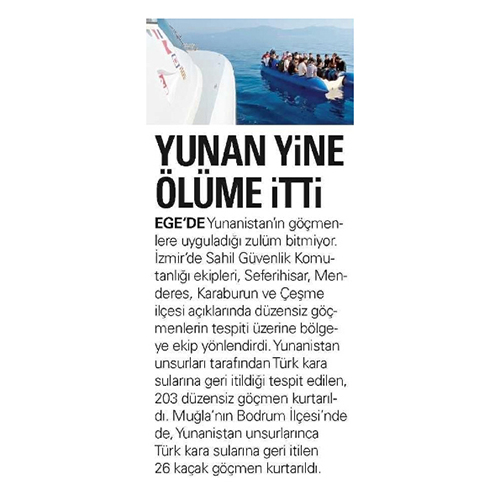 7 September 2022 |
4. Akşam, “The Greek pushed back to death again” The news about the violations of migrants’ rights by the Greek coast guard in waters off of Izmir generalizes them to the Greek identity. Greeks are associated with violence, creating a perception of a menacing identity. By establishing a hierarchical relationship between Greek and Turkish identities, Greeks are portrayed as lacking humane values. In this way, the feeling of hostility towards the Greeks is reinforced. |
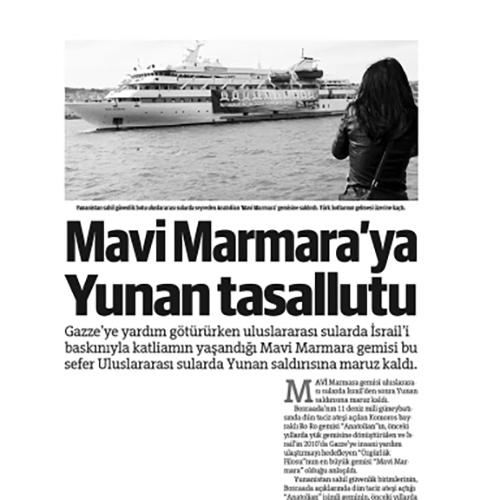 12 September 2022 |
5. Milat, “Greek attack on Mavi Marmara” The news, which covers the actions of the Greek coast guard against the cargo ship Anatolian (formerly called the Mavi Marmara) in international waters off of Bozcaada in the Aegean Sea, places responsibility for the incident on the Greek identity in its headline and text. It targets Greeks by associating them with aggression. In the headline, Greeks are designated as a threat with the use of negative adjectives. Hate speech is produced by reinforcing the perception of threat, as well as hostility toward Greeks. |
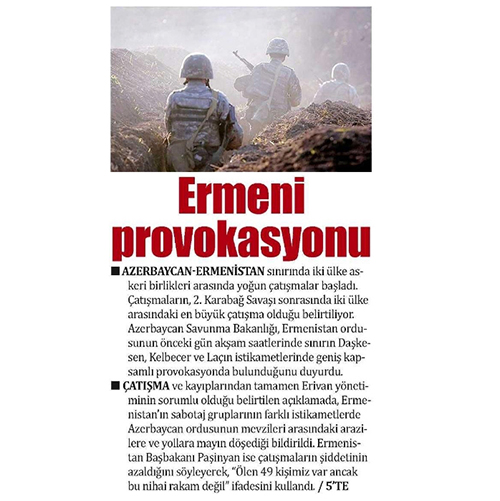 14 September 2022 |
6. İstiklal Gazetesi, “Armenian provocation” The news deals with actions between the armed forces of the two countries on the Armenia-Azerbaijan border. A statement made by the Azerbaijani Defense Ministry is quoted in the text of the news, and the responsibility of the events between the two countries is placed on the Armenian government and described as a “provocation.” However, the headline associates the incident with identity. Prejudices against Armenians are reinforced, and identity is targeted. The perception of hostility towards Armenians is fueled. |
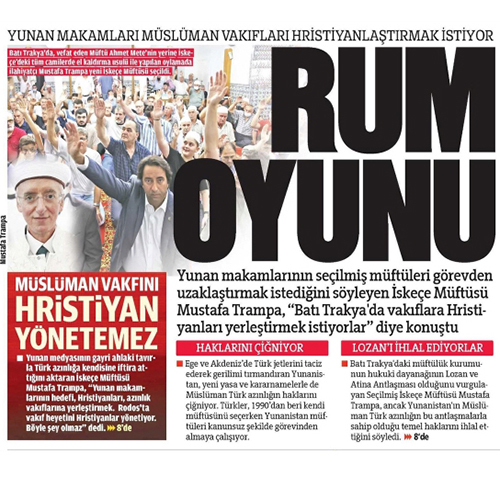 13 September 2022 |
7. Milat, “Greek game” The news problematizes the appointment of muftis to Muslim foundations by the Greek government in a newly enacted law. The news, which argues that the purpose of the appointments is to place Christian people in Muslim foundations and institutions in Greece, claims this violates the rights of the Turkish minority in Greece. However, Greeks and Christians are targeted with the phrases “Greek game” and “Crusader Game” in the headline and content of the news. With the use of these stereotypical expressions, existing negative prejudices and the perception of a threat are reinforced, and hostility is fueled. |
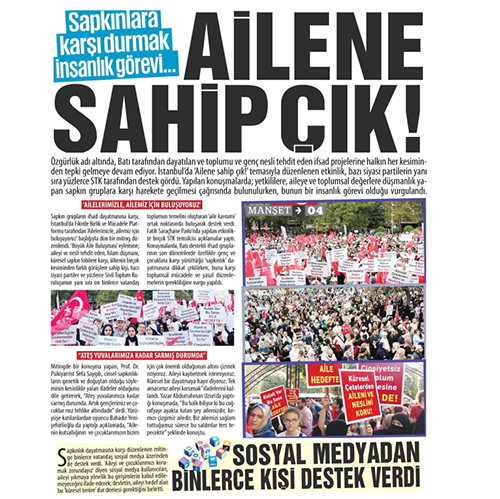 19 September 2022 |
8. Doğru Haber, “It is a human duty to stand against perverts” The story about an anti- LGBTI+ rally held in Istanbul’s Saraçhane Park and the speeches made there produces homophobic discourse by describing LGBTI+ individuals as “perverts” in its headline and text. It reinforces negative prejudices and a perception of hostility toward LGBTI+ people without recognizing their gender identity and sexual orientation. It stresses that LGBTI+ people are “immoral” and pose a “threat to society, family and youth” by claiming they create confusion in society. In this way, hate speech is generated, helping prevent LGBTI+ people from existing freely in society. |
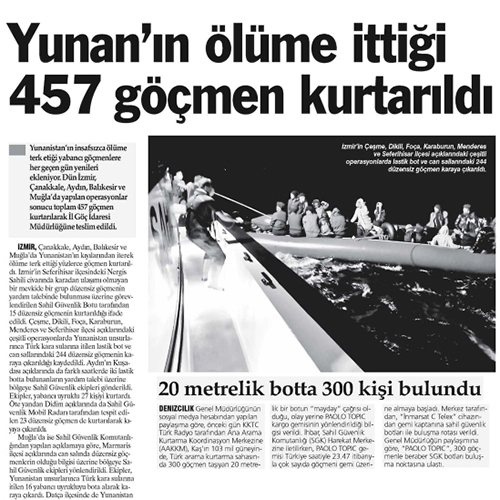 21 September 2022 |
9. Türkiye’de Yeniçağ, “457 migrants pushed back to death by the Greek are rescued” The news about the actions of the Greek coast guard against migrants places responsibility for the incident on identity in its headline. The Greek identity is pointed out as responsible for the human rights violations that occur due to state migration policies. A hierarchical relationship is created between Turkish and Greek identities, and intercommunal polarization increases. Greeks are associated with violence, and hostility is fueled as prejudices against Greeks are reinforced. |
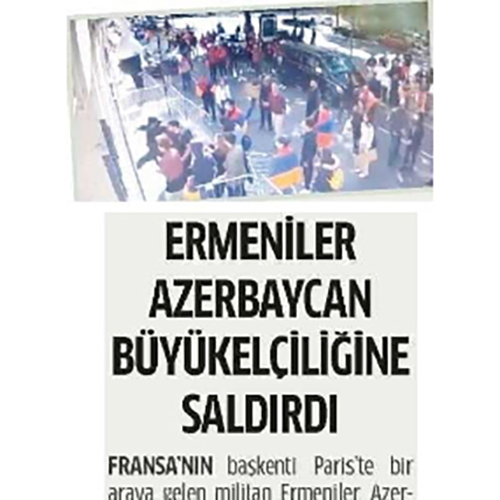 20 September 2022 |
10. Milli Gazete, “Armenians attacked Azerbaijani embassy” News about the alleged actions of a group of Armenians at the Azerbaijani Embassy in Paris associates the Armenian identity with crime. In the text and headline, the actions of a group of people are generalized to the whole identity. The phrase “militant Armenians” in the body of the story designates identity as a threat. Prejudices against Armenians are reinforced, and hostility is fueled with the rhetoric of hostility. |
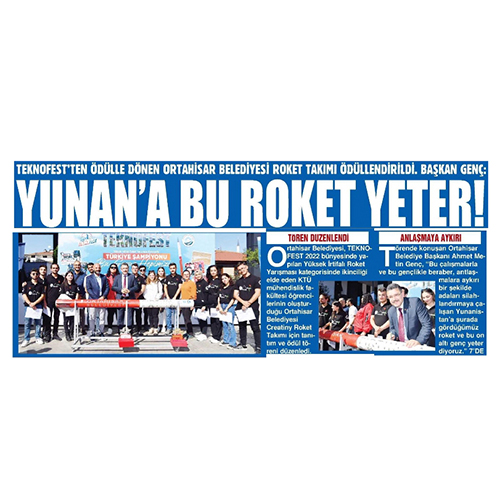 29 September 2022 |
11. Taka, “This rocket is enough for the Greek!” At an awards ceremony for a team of university students who placed in a high-altitude rocket competition, the mayor of the district of Ortahisar in Trabzon touched upon the debate between Turkey and Greece over the militarization of Aegean Sea islands. In a story about the speech, the headline uses the success of the students at the competition as a means to threaten. While Greece is being criticized in the debate about arming the islands, the Greek identity is targeted in the headline. Hate speech is produced by fueling hostility toward Greeks. |
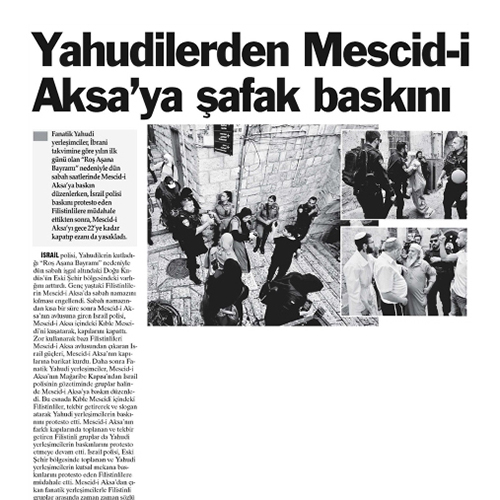 27 September 2022 |
12. Türkiye’de Yeniçağ, “Dawn raid by Jews on al-Aqsa” News about what happened between a Jewish group who wanted to go to Al-Aqsa Mosque, a holy site for Jews who call it the Temple Mount, during the Rosh Hashanah holiday and a Palestinian group who wanted to prevent them attributes the responsibility of the incident to the Jewish identity. Especially in the headline, Jews are associated with violence and are designated a threat. In this way, existing prejudices about identity are reinforced and hostility is fueled. |
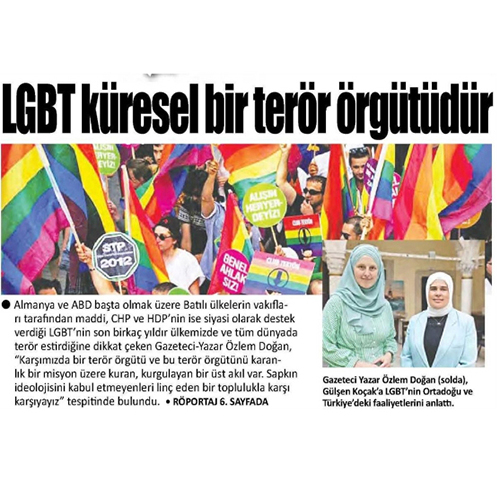 26 September 2022 |
13. Yeni Akit, “LGBT is a global terrorist organization” In an interview with a journalist, LGBTI+ people are targeted in the headline and body of the story by associating them with “terrorism.” In the text, LGBTI+ individuals are associated with “deviance” and “immorality” and are presented as a threat with the claim that they have international support. Because of their gender identity and sexual orientation, LGBTI+ people are associated with violence and aggression and are depicted a menace. In this way, hate speech is generated, and the existing prejudices and hostility towards LGBTI+ people are reinforced. |
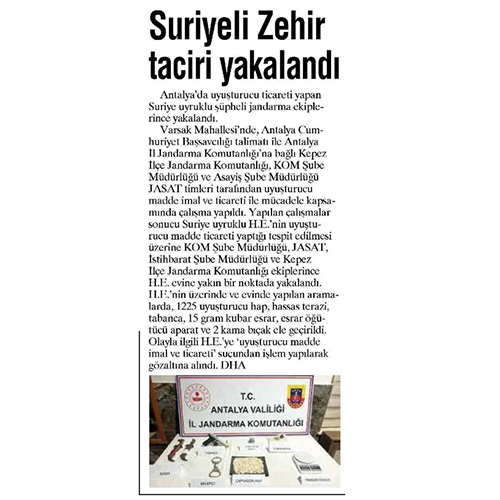 5 October 2022 |
14. İleri (Antalya), “Syrian drug lord caught” News about the detention of a Syrian allegedly involved in drug dealing in the city of Antalya associates Syrians with crime by emphasizing identity in the headline, even though national identity is not connected to the crime. The perception that Syrians pose a threat to the social order is reinforced, and existing prejudices against refugees are heightened. |
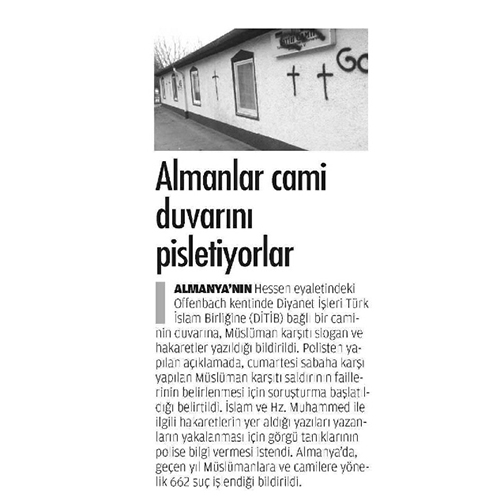 6 October 2022 |
15. Milat, “Germans profane mosque wall” The story claims that anti-Muslim slurs were written on the wall of a mosque affiliated with the Turkish-Islamic Union of Religious Affairs in Germany. Responsibility for the incident is placed on the German identity. The phrase “profane” in the headline generalizes it to identity with negative references. In this way, prejudices and hostility toward Germans are fueled. |
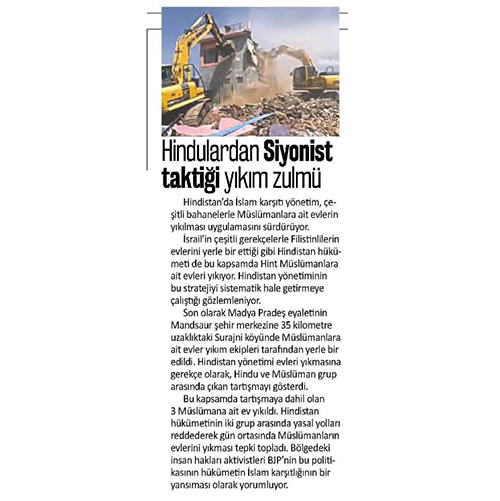 7 October 2022 |
16. Yeni Akit, “Zionist tactic of destructive persecution from Hindus” The news is about homes belonging to Indian Muslims that the government allegedly demolished due to the dispute between Muslim and Hindu groups. The headline attributes the responsibility of the events to the Hindu identity. Hindus are associated with persecution, creating the perception that Hindus pose a threat to Muslims. By targeting Hindus, existing prejudices against identity are fueled and hate speech is produced. |
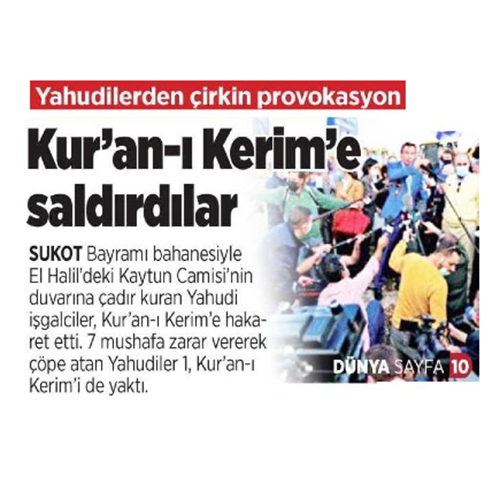 11 October 2022 |
17. Diriliş Postası, "Ugly Provocation from Jews: They threw Quran in trash" The news deals with the alleged actions of a Jewish group, but generalizes responsibility for the incident to the Jewish identity in both the headline and the body of the story. Jews are associated with violence and designated as a menace. Existing prejudices about identity are reinforced. |
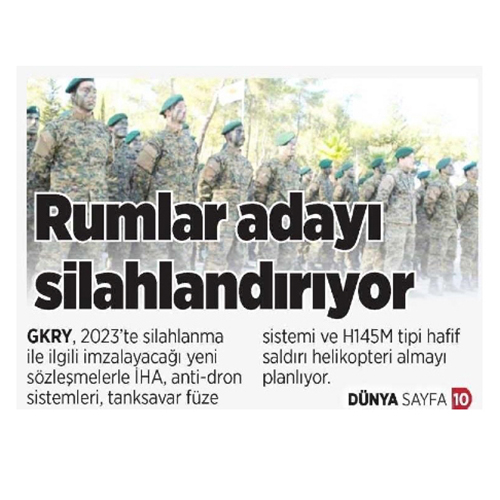 10 October 2022 |
18. Diriliş Postası, “Greeks are arming the island” The story about an increase in the Cypriot budget’s allocations to the Defense Ministry designates this as a threat. In the headline, this development is generalized to the identity and Greek Cypriots are associated with aggression, stoking prejudices and hostility toward Greek Cypriots. |
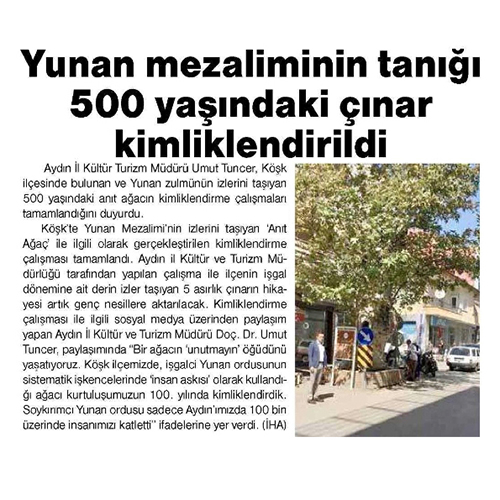 12 October 2022 |
19. Söke Ekspres Gazetesi, “500-year-old plane tree, witness to Greek atrocities, identified” The news about the identification of a 500-year-old plane tree by the Aydın Provincial Directorate of Culture and Tourism describes the tree as a “witness to Greek atrocities.” Responsibility for violence allegedly perpetrated by the Greek army during World War One is assigned to the Greek identity. With the use of negative adjectives, existing prejudices and the perception of hostility toward Greeks are fueled. |
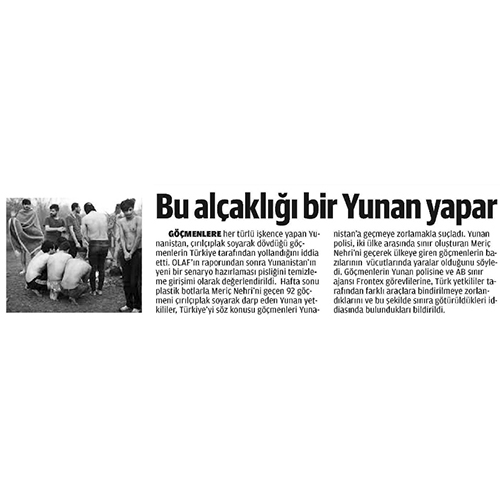 17 October 2022 |
20. Milat, “A Greek would do this despicability” The news about the situation of migrants trying to cross the Aegean Sea attributes alleged acts of violence to the Greek identity. As identity is associated with crime in the headline, prejudices against Greeks are reinforced and hostility is fueled. |
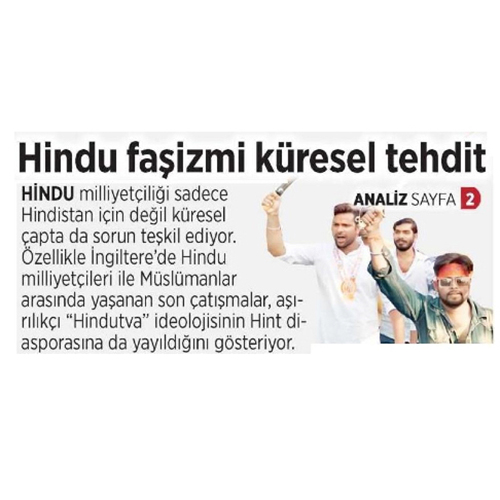 18 October 2022 |
21. Diriliş Postası, “Hindu fascism is a global threat” Tensions between Hindus and Muslims in the UK are discussed in the context of Hindu nationalism and Hindutva ideology. In the headline, the Hindu identity is associated with “fascism.” The story also associates Hindus with violence and puts forth the notion that they pose a global threat. This produces hate speech, and hostility toward Hindus is reinforced. |
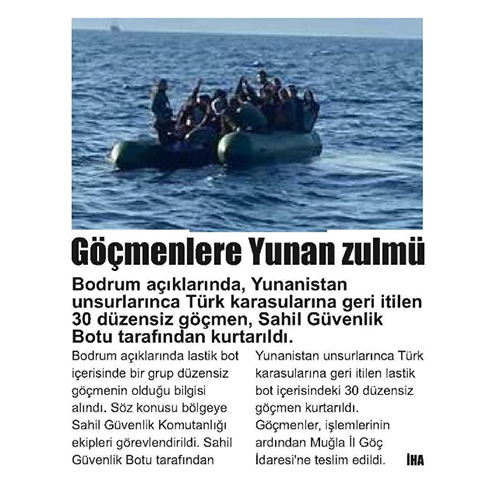 21 October 2022 |
22. Marmaris Yeni Sayfa, “Greek persecution of migrants” In this news story, the violations of migrants’ rights by the Greek coast guard near Bodrum places the responsibility on the Greek identity. Greeks are characterized by the expression “persecution” and are associated with violence. In this way, hostility and prejudices against Greeks are encouraged. |
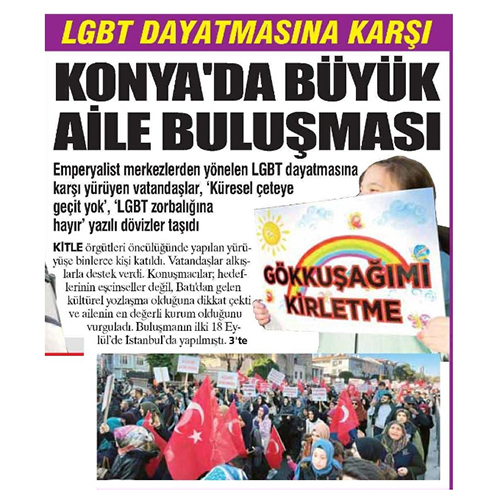 24 October 2022 |
23. Aydınlık, “Large family meeting in Konya against LGBT imposition” The phrase “LGBT imposition” in the headline for the news about a march against LGBTI+ people in the city of Konya is hate speech. The existence of LGBTI+ people is designated as a threat to family values and society. Hate speech is produced by the non-recognition of gender identity and sexual orientation, and prejudices and hostility towards LGBTI+ individuals are fueled. |
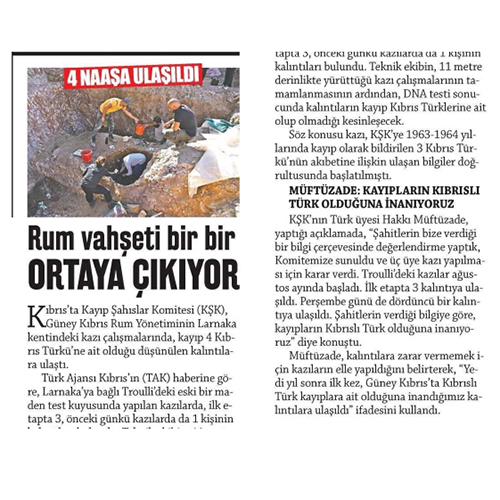 31 October 2022 |
24. Yeni Akit, “Greek brutality emerges one by one” News about the discovery of the remains of four people thought to be Turkish Cypriots missing since the early 1960s in Cyprus generalizes the incident to the Greek Cypriot identity. In this way, hate speech is produced, while prejudices and hostility toward Greek Cypriots are promoted. |
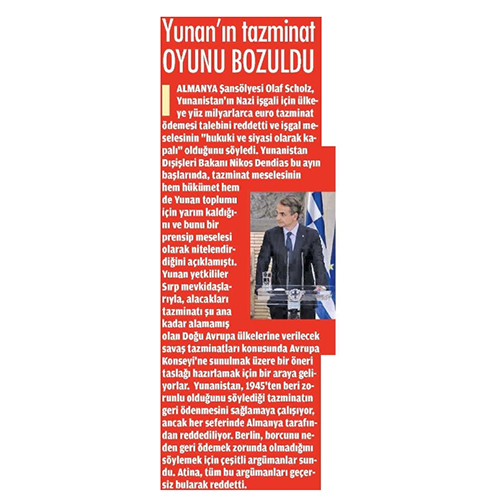 31 October 2022 |
25. Milat, “Greek's reparation game is spoiled” The news deals with Germany’s rejection for reparations that Greece has sought for the Nazi occupation during World War Two. The reparations claim is described as a “game” in the headline, and responsibility for the matter is generalized to the Greek identity. This reinforces negative prejudices against Greeks. |
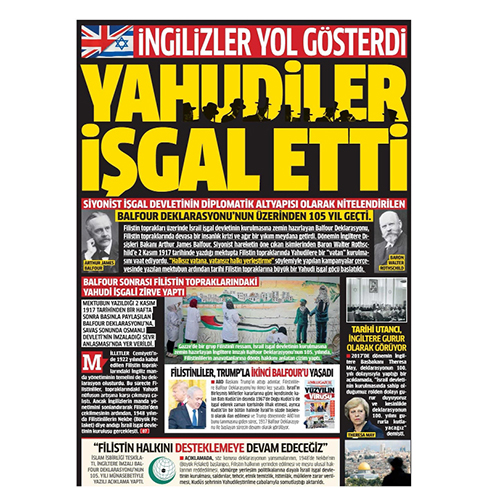 3 November 2022 |
26. Milli Gazete, “THE BRITISH LED THE WAY, JEWS OCCUPIED” The news about the foundation process of the Israeli state targets British and Jewish identities in its headline. The British and Jewish identities are held responsible for the actions of governments. Furthermore, by generalizing the actions of a Jewish group, Jews are associated with violence. Hate speech is produced through generalization and association with crime, and the prejudices and hostility towards British and Jewish people are reinforced. |
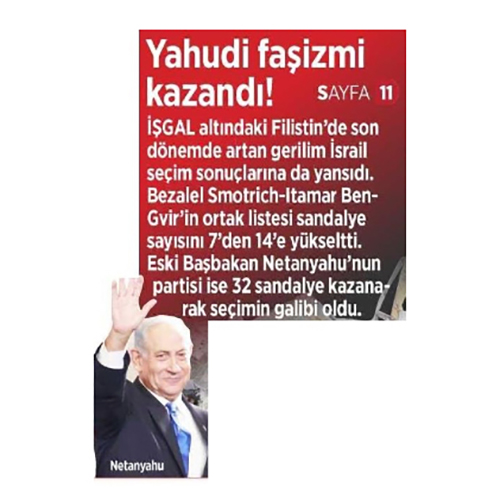 3 November 2022 |
27. Diriliş Postası, “The Jewish fascism won” The news about the elections in Israel and the attitudes of the winning party uses the phrase “Jewish fascism” in its headline while reporting the result of the election. Responsibility for what is happening in Palestine is placed on the Jewish identity, and Jews are associated with violence. In this way, the existing prejudices and sense of hostility towards Jews are reinforced. |
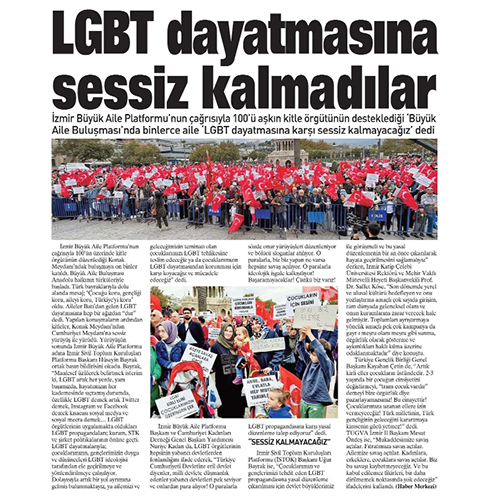 7 November 2022 |
28. Ege Telgraf, “They didn’t stay silent against the LGBT imposition” The news about the march in İzmir against LGBTI+ people and the talks that took place produces a homophobic discourse with the expression “LGBT imposition”. It emphasizes how gender identity and sexual orientation presents a threat to “family, youth and society”. Prejudices and hostility towards LGBTI+ people are fueled. |
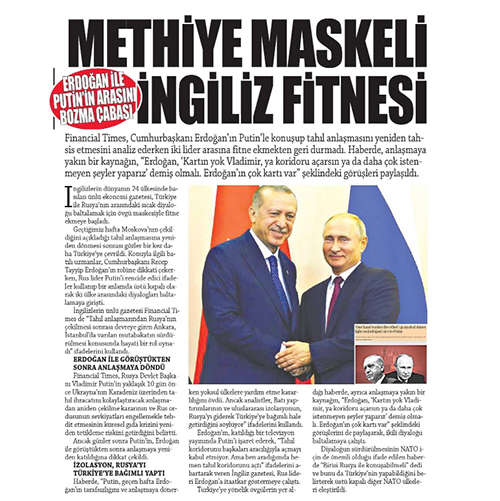 7 November 2022 |
29. Yeni Akit, “BRITISH INTRIGUE UNDER THE MASK OF PRAISE” In the news, coverage of the meeting between Turkey and Russia in the British media is reported by producing hostility and war discourse. The British identity is targeted with the phrase “malice”. With this negative attribution to the identity, it is claimed that there is an attempt to disrupt the dialogue between the two countries. The perception of hostility towards the British who are designated as a threat is fueled. |
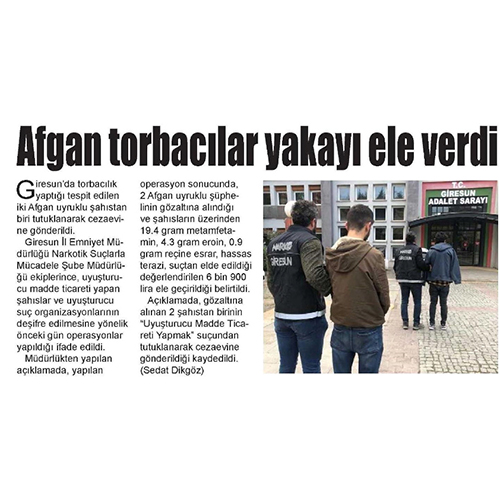 9 November 2022 |
30. Yeni Giresun Gazetesi, “Afghan dealers got busted” The news claiming that two people in Giresun committed drug trade emphasizes the Afghan identity in both the headline and the body of the story, even though the identity is not connected to the crime. The actions of two people are generalized to the identity and hate speech is produced by associating Afghans with crime. This method, which we frequently encounter in the production of hate speech against immigrants and refugees, reinforces the perception that refugees pose a threat. The existing prejudices towards refugees are reinforced. |
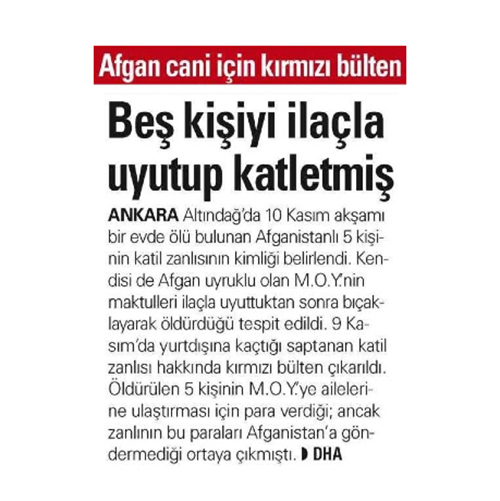 17 November 2022 |
31. Akşam, “Red notice for the Afghan murderer” The news reporting that a murder took place in Ankara and that the murderer’s identity has been detected emphasizes the Afghan identity in its headline even though the identity is not connected to the crime. By doing so, the perception that refugees pose a threat is reinforced. In this way, the existing prejudices and hostility towards refugees are fueled. |
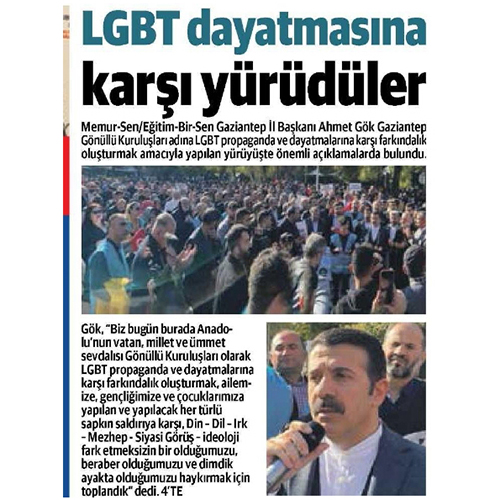 14 November 2022 |
32. Gaziantep Referans, “They marched against the LGBT imposition” The news about a march against LGBTI+ people in Gaziantep and the related press briefing produces a homophobic discourse in its headline and the body of the story. Gender identity and sexual orientation are described as “propaganda and imposition”. The visibility of LGBTI+ people is designated as a threat. The existing prejudices and hostility towards LGBTI+ individuals are fueled. |
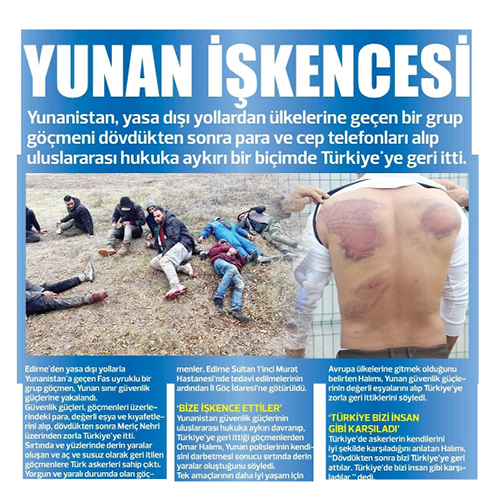 21 November 2022 |
33. Eskişehir Sakarya, “GREEK TORTURE” The news about the Greek security forces’ human rights violation of refugees targets the Greek identity. The responsibility of the violent acts against refugees is generalized to the whole identity and Greek identity is associated with violence. The perception that Greeks pose a threat is reinforced. |
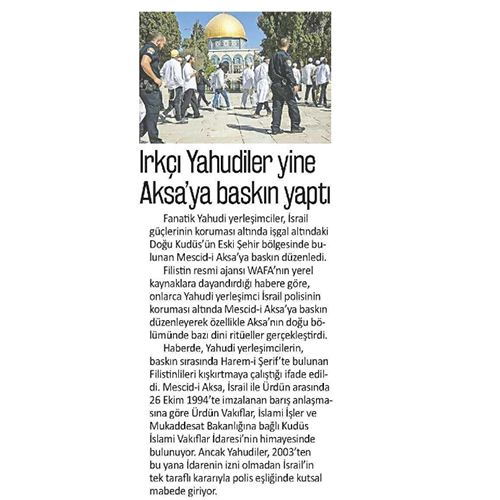 21 November 2022 |
34. Yeni Akit, “Racist Jews attacked Aksa again” Based on the Palestinian local agency WAFA’s local sources, the news reports the actions carried out by a Jewish group in Al-Aqsa Mosque. In the headline, the responsibility for the incident is generalized to the Jewish identity. Hate speech is produced by associating Jews with racism and violence. The existing prejudices and hostility towards Jews are reinforced. |
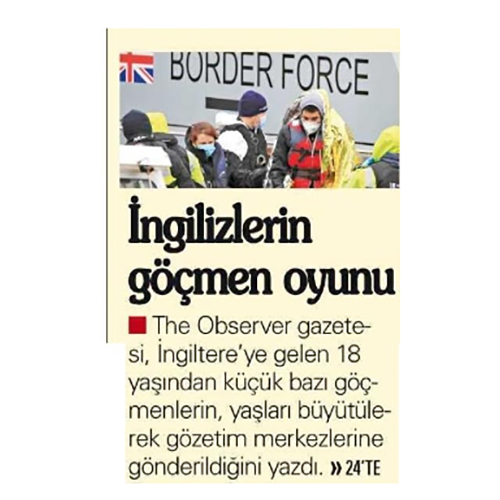 29 November 2022 |
35. Akşam, “The British’s immigrant scheme” Citing the news published by the Observer, the story deals with how the dates of birth of child immigrants coming to the UK were altered to make them over 18, so that they can be sent to the detention center for adults. However, the incident is generalized to the British identity with the expression in the headline. By placing responsibility on the whole identity, the prejudices against the British are reinforced. |
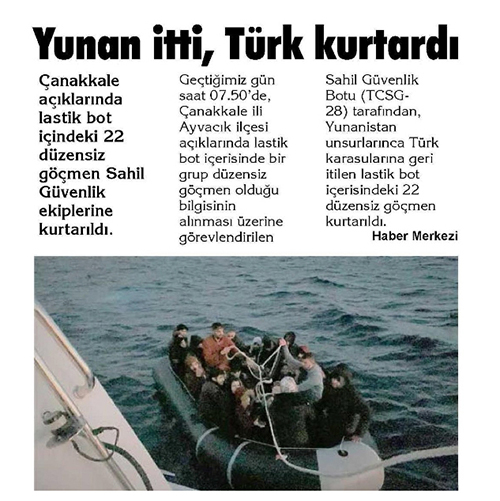 30 November 2022 |
36. Gazete Boğaz, “The Greek pushed, the Turk rescued” The news about the alleged actions committed against immigrants by the Greek coast guard generalizes the responsibility of human rights violations to the Greek identity. In the headline, a hierarchical relation between Turkish and Greek identities is established. The Greek identity is associated with cruelty and the prejudices against Greeks are reinforced. |
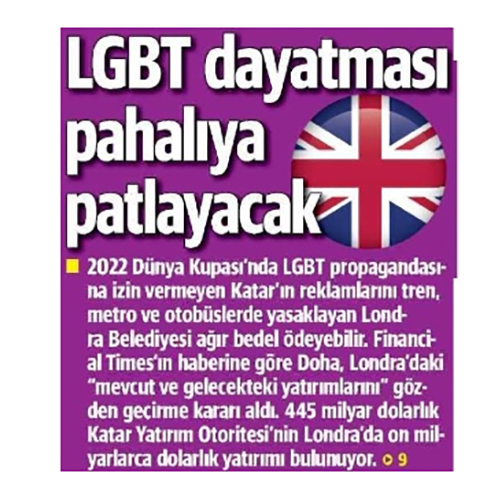 28 November 2022 |
37. Yeni Şafak, “LGBT imposition will be costly” The news deals with how London City Hall decided to not allow Qatar’s World Cup advertisements in public transport because of the laws about LGBTI+ people. In the headline, LGBTI+s’ existence is designated as a threat and the hostility towards LGBTI+ people is fueled. |

This project is financed by the European Union.


